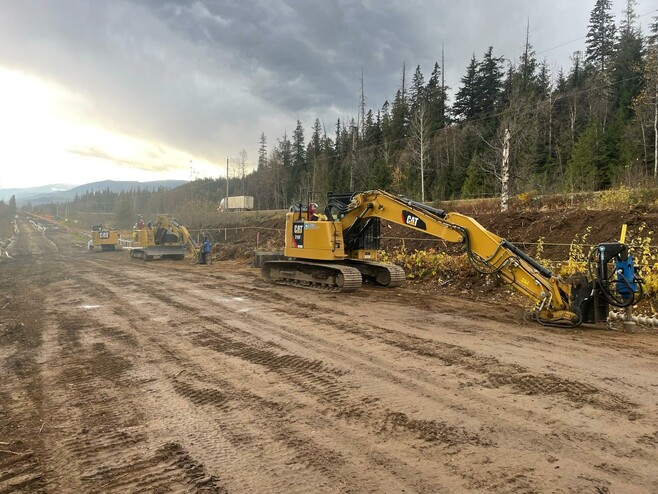Services
Well-Point | Deep Well | Dewatering
NCS Fluid Handling Systems are experts in Dewatering using Well-Pointing and Deep Well Dewatering Systems.
NCS Fluid Handling Systems is known as the best-in-class dewatering designer and service provider when engineered solutions are required for excavations that extend beyond the ground water table and reliable site dewatering systems are required.
For shallow excavations, single-stage well-point dewatering systems are often the most efficient method to achieve an adequate draw down. For deeper excavations a second stage of well points can be installed or alternatively a deep well dewatering system is utilized.
NCS Fluid Handling Systems professional engineering staff review the geological report, works with the environmental consultant, and offers a comprehensive dewatering package that includes a dewatering plan, equipment specification, recommendation, water treatment, filtration and groundwater monitoring.
Click here to download our PDF on Well-Pointing and Dewatering

More – Well Point | Dewatering | Deep Well
Correct installation of well points or Deep Well dewatering equipment and monitoring of the dewatering process leads to higher system efficiency and cost savings. NCS personnel are highly trained, which links to achieving necessary results within a planned time frame.
Our team has been providing well-point and deep well dewatering systems to the construction industry for over a decade. Through our extensive experience finding the right dewatering solutions for projects both large and small, we have managed to develop the equipment and knowledge to solve virtually any pumping problem.
We have streamlined our well-point or deep well dewatering services by utilizing engineering staff, field personnel, top equipment and learned strategy.
We offer turnkey dewatering services and well-point dewatering systems that meet all your well-point dewatering or deep well dewatering, ground water control, ground stabilization, deep well dewatering, sewage bypass, River Diversion, open pumping and hydraulic submersible pump applications.
We have a range of well-point dewatering pumps, submersible deep well pumps, diesel or electric motor drive, or diesel driven piston pumps. Our silent units are best suited for noise sensitive areas with a decibel rating of 56 dBA at 10 meters.
Whether a planned project or an emergency, we are here to help you out with the most efficient and effective well-point dewatering also known as sand-point dewatering and Deep well dewatering solutions.
Dewatering
Well-Point Dewatering aka Sandpoint Dewatering is the process with an objective to stabilize soil.
While well-pointing is used to dewater an excavation it also is used to stabilize soils with low permeability with some silts or sandy silts. This is achieved by using Vacuum, generated by pumps in most cases and simply put the vacuum generated increases the hydraulic gradient casing flow to the well-point / header and is useful to draw down more than 18 to 25 feet of ground water in low permeable soils. But other than having an excavation with water in it, why does NCS Fluid Handling Systems design, engineering and technicians focus on all the ground and site-specific conditions to stabilize soil and deliver a dry excavation.
In general, dewatering means modification of ground water by redirecting seepage, lowering the groundwater table and simply reducing the water content in foundation soil to completely dry and stabilize the soil within an excavation ensuring the successful long-term use of assets such as water, gas or oil pipelines.
Any engineer who deals with soils should have good knowledge about the soil-water relationship. This is where NCS Fluid Handling Systems has gained customer trust and a solid reputation for delivering dry excavations. NCS Fluid Handling Systems designers consider ground water hydrology with an emphasis on water flow characteristics in respect to directions and quantity as well as subsurface soil conditions. NCS Fluid Handling Systems designers and technical products representative work to ensure that our customers are aware of benefits derived from reduction of pore water pressure and respective increase in soil stability and strength. The net results are improved in slope stability and the required increase in bearing capacity which is required for the long-term utilization of such assets as water and oil pipelines.
Well-point dewatering is not only required for civil engineered projects, but systems are also deployed / installed in other applications such as mining projects.
The benefits of a properly designed, installed and operating dewatering system are as follows:
- To stabilize natural or constructed slopes.
- To reduce surface erosion.
- To treat granular soils by reducing their compressibility.
- To decrease lateral pressures on retaining walls or foundation, even when items such as sheet piles are installed, reduced groundwater pressure and adds benefits to safety and stability.
- To provide increased bearing strength and capacity of compacted foundation soils.
- To keep working place dry like excavation for dams, building foundations and tunnels.
- To prevent piping a phenomenon of migration of soil particles in groundwater.
- To improve the transportation characteristics and/or the workability of borrow pit materials.
If we focus on a couple variables, then the techniques used to dewater soil vary. NCS Fluid Handling Systems designers use different techniques for coarse-grained soils versus that for fine grained soils. It may be that Coarse grained soils can be dewatered through the simple use of gravity which allows drainage into ditches, slump and wells and then discharge of accumulated water using pumps to designated discharge locations. Remember to consult with the NCS Fluid Handling Systems engineers if additional filtration (such as discharge rule of dissolved iron, regulated in various parts of Canada) is required, this may also include holding water for sampling.
However, gravity drainage is not suitable in situations where there are fine grained soils. Drainage will be adversely affected and is ineffective or very slow. This type of soil dewatering process requires forced consolidation and therefore the selection of the appropriate dewatering techniques for ground water control requires the expertise that NCS Fluid Handling Systems engineers have. These vary from electro-osmosis to large casing bore holes with submersibles or well-point dewatering aka sand point dewatering. In some situations, these may be used in combination or separately with good success. Along with drainage and seepage NCS Engineers additionally consider the benefits of filtration of geosynthetics in our system designs providing longer term success and cleaner water disposal. This was exemplified in some recent projects that the NCS team installed and operated in Eastern Alberta and Saskatchewan, where the groundwater was extremely turbid and the NCS installed system removed all solids without any additional filtration of the discharge water.
To summarize the above the traditional dewatering techniques are mainly gravity flow methods using open ditches, etc., gravity flow well including bored wells and submersible pumping, well-point or sand point systems and other vacuum dewatering applications.
In this article we will focus on the well-pointing system technique. When using this technique, the vertical wells are spaced closely together 1 meter (3′) up to 3 meters (10′) and are single pipes attached to a common header pipe which is then attached to the vacuum pump, in many applications it is also recommended that a standby or backup vacuum pump be onsite for unforeseen or planned maintenance situations. The pipe wells may range from 35 cm (1 1/2″) to 50 cm (2″) in diameter.
Well points are installed by high pressure water jetting or augured by use of the newly designed NCS Fluid Handling Systems auguring system eliminating the use of high-pressure pumps and on-site water storage making sites less congested, cleaner, reducing heavy equipment support and safe, fast and easy well point installation. In either situation once the bored wells are established to designated depth, specifically sized filler materials are installed into the hole. This process may also be referred to as sanding in. To start the flow of water to wells, a vacuum is created on the entire system. The vacuum is applied at the filler section of the well point tip, which is sealed off maintaining the vacuum condition. Atmospheric pressure forces the water to flow toward well increasing seepage. This inflow water may be very low and intermittent pumping of the well may be required to discharge accumulated water; this is known as tuning the points. In other situations, such as the “NCS Fluid Handling Systems” installations in the “Lower Mainland of British Columbia” the well pointing system runs non-stop continually pumping water to surface and through “NCS Fluid Handling Systems iron removal filters”. NCS engineers calculate the net vacuum used at well point by subtracting lift in riser pipe from the vacuum generated in the header pipe. “NCS Fluid Handling Systems skilled technicians” take extreme care to ensure all connections of the vacuum system are airtight and maintain this situation throughout the project. In some applications NCS designers will incorporate additional well sealing materials, such as bentonite at the top of the well point riser pipe, ensuring the long term required seal around is maintained.
